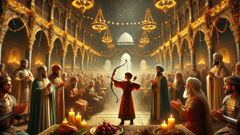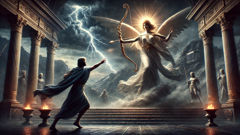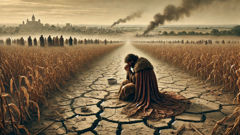Introduction
The ancient city of Ugarit once thrummed with the heartbeat of kings, priests, and craftsmen. Its streets wound between sunbaked walls and the aroma of cedar resin drifted from the harbor where ships unloaded goods from distant lands. Beyond the bustling markets and sacred courtyards, legends were born—none more enduring than that of Aqhat, a tale as old as the stones of Canaan and as poignant as the desert wind at dusk. In these times, when the divine walked among mortals and the boundary between man and god shimmered like a mirage in the noon heat, every prayer seemed to stir the heavens. King Danel, the just and sorrowful ruler of Haran, dwelt in a palace whose columns bore the stories of his ancestors. Childless and growing old, Danel was plagued by the ache of a legacy slipping away. Each morning, he ascended to his roof, lifting his voice in fervent petition to El, the father of gods, and to Baal, lord of storm and rain. His cries for a son, a soul to inherit wisdom and lineage, rose with the sun and set with the fading light. The priests whispered that the gods had closed his wife’s womb, perhaps out of caprice or for some forgotten slight. But Danel’s devotion never wavered. He offered lambs on altars and poured oil over sacred stones, his prayers echoing across the stone courtyards until even the household dogs stilled to listen. And so the city waited, holding its breath alongside its king. It is here, amid longing and divine silence, that the story of Aqhat begins—a story woven of hope, jealousy, fate, and the fragile thread connecting mortals to gods.
The King’s Prayer and the Divine Gift
Danel, ruler of Haran, was respected by his people for wisdom and justice, yet his heart was heavy with sorrow. No son had blessed his house, no laughter of a child echoed through the cedar halls. In a world where lineage was life’s greatest assurance, his family’s future was shrouded in uncertainty. Driven by hope, Danel prayed with a constancy that impressed even the gods. Each morning, he poured his soul into ritual: water from the sacred well splashed onto his face, then onto the worn stones of the altar. His voice rose above the city’s waking noise, calling out to El, “Father of All, hear me! Grant me a son to continue my name, to honor your altars after I am dust!”

The seasons turned. Rain came and went, fields grew lush and fell to dust, and still Danel prayed. On the seventh day of the seventh month, as dawn painted the horizon in crimson and gold, a hush fell upon the city. That night, Danel’s dreams were invaded by a vision—El himself appeared, ancient and robed in light. The god’s voice rumbled like distant thunder: “Your faith has not gone unseen. In your house a son shall be born, a joy to your heart, a pride to your name.”
When Danel awoke, tears streaked his cheeks. Within weeks, his wife, long barren, felt life quicken within her. The palace brimmed with new energy as midwives whispered blessings and musicians tuned their lyres. When the child was born, healthy and strong, Danel named him Aqhat, meaning ‘Gift.’ The city celebrated for days—feasting, dancing, and pouring wine in honor of the gods who had finally answered.
Aqhat grew quickly, tall and keen-eyed, his laughter carrying through the palace like a songbird’s call. Danel saw in him not only the hope of his house but the promise of Ugarit’s future. From a young age, Aqhat was instructed in all the arts befitting a prince: archery, horsemanship, diplomacy, and—perhaps most importantly—the sacred traditions that bound mortals to gods.
When Aqhat reached manhood, word spread of a festival to honor Baal, bringer of rain. Among the gifts brought to the palace was a bow of unrivaled beauty—crafted by Kothar-wa-Khasis, the divine artisan. Its limbs gleamed like polished amber, its string spun from silver moonbeams. The gift was a marvel, a symbol of favor and fortune. Danel placed it in Aqhat’s hands during the festival’s final feast. “This is no ordinary weapon,” he warned his son. “Treat it with respect, for its maker is not of this earth.”
Aqhat’s skill with the bow soon became legend. Hunters returned from the hills with stories of his unerring aim, of deer struck mid-leap and birds felled in flight. The people cheered him as a hero, but in the high places where the gods gathered, his prowess did not go unnoticed. Among them was Anat, the fierce and beautiful goddess of war and the hunt. Seeing a mortal possess a weapon forged for divinity stirred envy in her heart—a feeling that would soon set fate’s wheel turning.
The Wrath of Anat and the Bow’s Curse
Anat, capricious and relentless, could not abide that a mortal should hold what was once destined for the hands of gods. In her celestial court, she brooded, her eyes flashing with storm. The memory of Aqhat’s steady arm and Kothar’s shining bow gnawed at her pride. She descended from the high places, veiling herself in mortal beauty, her steps stirring dust on the palace threshold.

Danel’s household was entranced by the visitor’s radiance. Anat, disguised as a noblewoman, entered the halls where Aqhat trained. She watched him loose arrows at distant targets, each shot true. Approaching him with a smile that hid her stormy purpose, she spoke in a voice as soft as silk: “Handsome prince, I see that you possess a bow unlike any other. Won’t you let me hold it?”
Aqhat, polite but wary, shook his head. “Forgive me, lady, but this bow is a sacred gift. It belongs to me by my father’s blessing and by the will of the gods.”
Anat’s patience thinned, but she pressed on, offering him gold and promises of immortality. Still, Aqhat refused. At last, Anat’s voice grew cold. “Do you not know who stands before you? I am Anat. I could grant you eternal life for your bow.”
Unmoved, Aqhat replied, “Even if I lived forever, what would I do with endless years? No mortal escapes death.”
Anat’s pride transformed to rage. Insulted by Aqhat’s refusal and bold words, she stormed from the palace. In her fury, she ascended to the heavens, seeking El’s permission to punish the mortal prince. El, old and slow to anger, counseled patience, but Anat’s mind was set. She vowed to reclaim the bow by force if she could not win it by charm.
Anat summoned Yatpan, her loyal servant, a cunning hunter who knew the wilds as well as any god. She whispered her plan, and he agreed to do her bidding. One dusk, as Aqhat hunted alone in the hills outside Ugarit, Yatpan watched from the shadows. With a silent prayer to Anat, he loosed a stone from his sling. It struck Aqhat, whose body tumbled into the ravine below, his legendary bow clattering beside him. The prince’s blood soaked the earth.
Yatpan retrieved the bow and fled, delivering it to Anat’s temple in the high mountains. There, Anat rejoiced—yet her triumph was hollow. The bow, tainted by murder and sorrow, brought her no joy. The fields around Haran withered, rain ceased, and the city fell under a pall of grief. Danel, robbed of his only son, wandered the countryside in mourning, tearing his robes and weeping beneath the silent gaze of the gods. The earth itself seemed to mourn with him, for where Aqhat’s blood had fallen, even the grass turned brown and brittle.
The King’s Lament and the Curse on the Land
Danel’s wail shattered the quiet dawn when news of his son’s death reached him. He tore his garments and poured ashes on his head, wandering from shrine to shrine in desperate supplication. In every temple, from the shadowed pillars of Baal’s great house to the sacred olive groves of Asherah, he pleaded for justice. Priests and commoners alike mourned with him; all remembered how the city’s fortune had flourished since Aqhat’s birth and faltered in his absence.

The land itself seemed to grieve. Rain clouds circled but refused to open. Crops withered to stubble, and the once-bustling harbor fell eerily silent. In his grief, Danel followed ancient mourning rites: he sat upon the earth for seven days, refusing bread and water, cursing the day of his son’s death. His cries rose into the sky, carried by dry winds to the distant mountains where Anat dwelled with her ill-gotten prize.
But Anat, though a goddess of war and hunt, found no satisfaction in her victory. The bow brought her neither joy nor pride. Instead, it seemed to hum with the memory of Aqhat’s refusal, its string silent as a tomb. The crops’ failure and Danel’s lament echoed even in the halls of heaven. The other gods took notice; El himself listened to Danel’s grief as it rose like incense.
Moved by Danel’s unwavering devotion and sorrow, El finally relented. In a vision, he appeared to Danel and promised that justice would be done. “The blood of the innocent cries out from the ground. Anat has acted rashly, and her pride will bear bitter fruit.”
Danel gathered his strength and led the people in rites of atonement. They bathed in the river and offered sacrifices to placate the gods. The city’s oldest women wove mourning bands for every wrist; children planted olive shoots at the edge of the fields. The mourning spread far beyond Haran—neighboring towns sent envoys bearing gifts of grain and honey to comfort Danel and honor Aqhat’s memory.
Yet justice in the world of gods was never swift. Anat, proud but now haunted by guilt and the city’s suffering, withdrew from her temple. The earth still refused to yield. It was said that the spirit of Aqhat wandered the wild places near his grave, mourning not only for himself but for his people, whose hope had died with him.
Conclusion
As the years passed, the memory of Aqhat’s fate lingered in Ugarit like a shadow at sunset. The bow, once a symbol of divine favor, became a warning against mortal pride and the unpredictable will of the gods. Danel never ceased to mourn, yet he rebuilt his city and his people found new ways to honor the legacy of his lost son. Each spring, offerings were left at Aqhat’s grave—a bow of reeds, a handful of wild barley—so the spirit of the prince would know he was not forgotten. In time, the land slowly healed. Rain returned to the fields, and grain once more filled the granaries. Danel grew old and wise, revered as a ruler who had suffered and endured. And though Aqhat’s story was one of loss, it became a thread in the tapestry of Ugarit—a reminder that even the strongest bonds can be sundered by jealousy and grief, yet memory and love endure beyond the reach of gods. The epic of Aqhat echoed through generations: a tale of longing, sacrifice, and the fragile balance between mortals and the divine.













